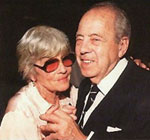Born in the Bronx, as a young child Theodore A. Atlas moved with his family to Staten Island, where his parents operated a dry goods store. He would remain there for the remainder of his 88 years, serving the people of the borough he quickly came to love.
his parents operated a dry goods store. He would remain there for the remainder of his 88 years, serving the people of the borough he quickly came to love.
After graduating from Curtis High School, the future doctor went on to the New York University School of Medicine to seek his medical degree. He graduated from medical school in 1927, and for the next 55 years practiced medicine on Staten Island. Dr. Atlas founded two hospitals in the borough, first Sunnyside Hospital and later Doctor’s Hospital. He also served as Medical Director for six nursing homes, making regular visits to these homes but refusing to accept compensation for his services.
Despite his “big” accomplishments, Dr. Atlas was better known on Staten Island for the “little” things he did, for the personal care he brought to his patients. In an age when the operation of hospitals and the practice of medicine had become big business, Dr. Atlas made house calls until he retired at the age of 80. He provided free medical care and free samples of medicine to patients who could not afford to pay. He went to the projects to serve the poor while other doctors refused to go there. And on Wednesdays the doctor used blankets and pillows to make makeshift beds in his office and performed tonsillectomies on patients who could not afford to pay for surgery. Recognizing that the poor were not receiving the medical services they needed and that he could not satisfy the vast need in his office, Dr. Atlas was inspired to open Sunnyside Hospital.
Even after founding Sunnyside, Dr. Atlas continued to make house calls. He is fondly remembered for wading through snow drifts and climbing through windows to deliver babies during winter’s worst storms, and for being seen with his pajamas under his working clothes because he never made it home after a late night emergency house call. When a family could not pay for the house call, he would accept a cup of tea as payment in order to allow the family to preserve its dignity.
Dr. Atlas left behind a valuable legacy in his deeds and in the example he set. His generosity in caring for people in their time of need and in providing free medical care for those who could not afford it, and his ever-present awareness of his patients’ very human needs, their need for dignity and respect, are the qualities that define the spirit of the Foundation which is named in his memory.